
From his perch nearly 500 feet in the air, atop the preheater tower at Lehigh Cement, Jay Trankley can get a good look at all 2,500 acres of his employer’s sprawling operation, as well as the small town of Union Bridge, Md., that many of its workers call home.
Trankley, a process utility person at the plant for the past 15 years, helps to maintain the massive kiln that is central to the cement-making process and to the production site. He is one of more than 110 members of Local 8-00031 who work at the state-of-the-art Union Bridge facility.
The basic recipe that Trankley and his USW co-workers follow to make their product is the same as it has been for hundreds of years, but the processes, technology and quality control at Lehigh are as modern as any in the industry.
“It’s a better quality product,” said lab automation tech Lorne Keefer, who oversees some of the high-tech equipment that monitors samples and flags imperfections to ensure a top-of-the-line end result.
‘We Supply America’
Their commitment to excellence puts the workers at the Lehigh plant, along with the 160 other units in the USW cement council, on the front lines of a union-led campaign to secure trillions of dollars in federal infrastructure investments and ensure the growth of good union jobs for decades to come.
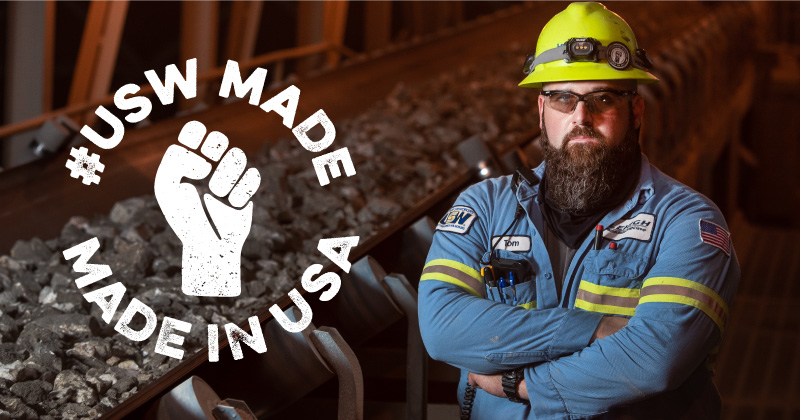
“We need it to happen,” Local 8-00031 Grievance Chair and 10-year member Tom Eyler said of the USW’s infrastructure push, dubbed “We Supply America.”
Because cement is a key component of the materials used to construct buildings, build dams, pave roads and erect bridges, workers like those at Lehigh are a big part of making sure that the supplies needed for a comprehensive infrastructure overhaul will be made in the United States with union labor.
That would be good news for Local 8-00031 members, company management, and all of the residents of tiny Union Bridge, which, according to the most recent census data, is home to only about 250 families and fewer than 1,000 people.
“It’s critical for the local economy,” Eyler said.
That point was proven many years ago when the company, under scrutiny from a group of local residents who questioned whether the town truly needed an industrial plant to sustain its economy, conducted an experiment by paying the work force with stacks of $2 bills. The notes began filling up the cash registers of every business in town.
“If this place didn’t exist, the town wouldn’t exist,” Eyler said.
‘To The Next Level’
A major infrastructure program is likely to be a shot in the arm for Lehigh’s business, which has already been steady even throughout the COVID-19 recession, said assistant plant managerChad Mullican.
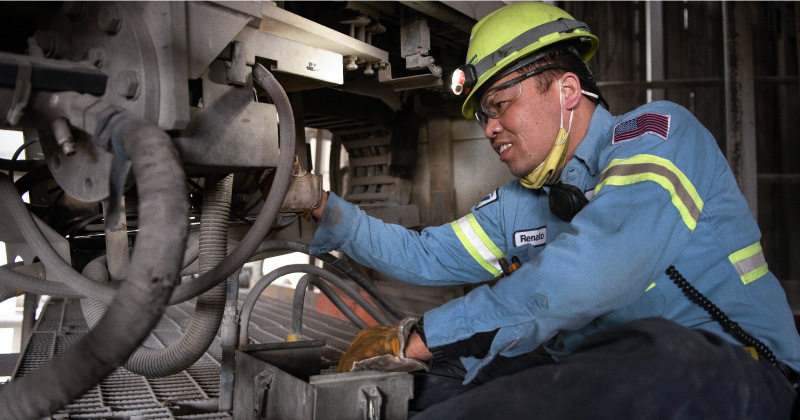
President Joe Biden’s “Build Back Better” jobs and infrastructure program, which includes a major push toward greener technology, would also shine a light on the advances that the cement industry, and Lehigh in particular, has made over the years to control emissions and ensure that the production process has the smallest possible environmental footprint.
“The thing that sets us apart is our willingness to grow and adapt. This is going to take us to the next level,” Mullican said of the infrastructure proposal. “It would be huge for both us and the environment.”
Lehigh’s current position is solid enough that the company recently opened a second quarry in nearby New Windsor, about six miles from the plant, and constructed an advanced conveyor system that carries stones from the quarry to a storage facility on the plant grounds in Union Bridge. Between the new quarry and the original one, the company estimates that it has enough limestone available to last at least another 87 years.
Always in Motion
Some of the stones that USW members take out of the quarry are as large as compact cars, even after they are blasted loose from the earth. Workers then truck those boulders to a machine that crushes them into small enough pieces to be placed onto the closely monitored conveyor.
Once they reach the plant, they are ground down and precisely blended with a mix of sand, iron slag and ponded ash. That mixture is heated and formed into nuggets known as clinker, which then goes to a finishing mill where it is combined with other elements to optimize the quality and strength of the final product.
The cement-making process demands that there is always something in motion at the plant, and USW members are a key part in every step of the operation. Throughout the day, 10,000 points of data churn through the plant’s computerized monitoring system, which workers constantly track to ensure the product they are making is the best it can be before it is sealed into bags and shipped to customers, which include hardware retailers and builders at construction sites.
“It’s astounding,” Eyler said of the size and complexity of the operation. “You take it for granted.”
Generations of History
The original factory, known as Tidewater Portland Cement Co., was built in 1910. Lehigh purchased the facility in 1925 and invested in several major modernization efforts over the years. Today, the plant, which operates 24 hours a day, 7 days a week, is able to produce more than 2.5 million metric tons of cement each year.
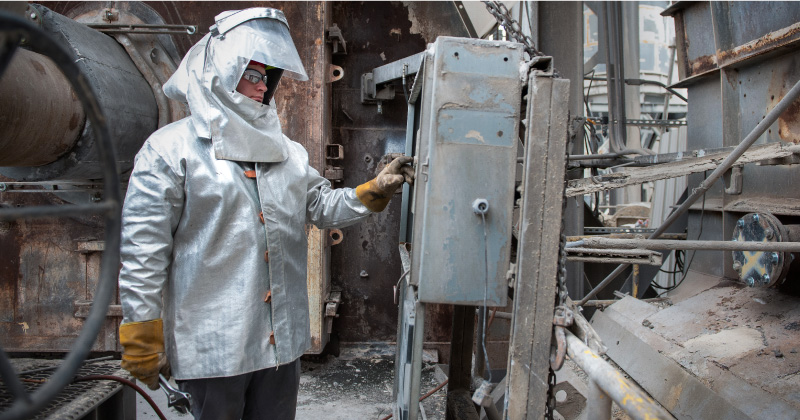
In the early days, most of the work now carried out by computers was done by hand, but the increased automation in recent years creates a more consistent, stable output, said Keefer, who has worked at the plant for 27 years.
He is one of many workers at the site who have lengthy terms of service. Mullican has been with the company for 25 years, the first 10 or so as a USW member before he joined management. It’s a common story at Lehigh for the company to promote union members through the ranks.
“We grow our talent from the inside,” Mullican said.
Family Atmosphere
Local 8-00031 President Brad Llewellyn works in a control room with more than a dozen screens of data on the Lehigh operation. He has been with the plant for 23 years and has known Mullican since the two were in elementary school.
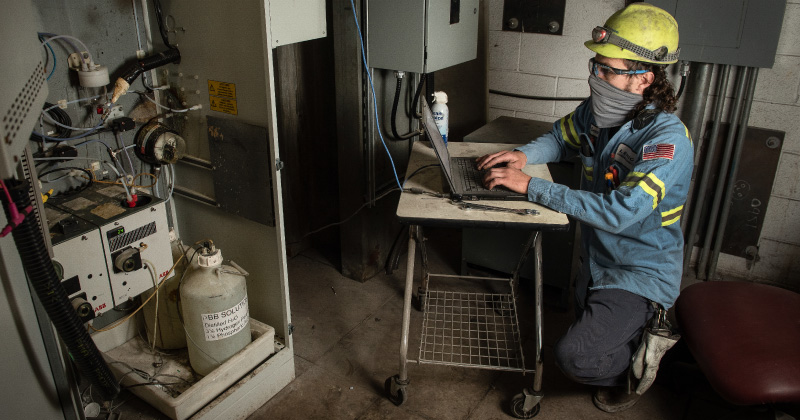
That closeness makes for a family-like atmosphere that spreads throughout the factory and into the community, Llewellyn said.
“To me, our plant is like a small community, like our community itself,” he said. “To see this community be able to contribute the way that we do, to have that much of an impact, it makes you stick your chest out with pride.”
District 8 Director Ernest R. “Billy” Thompson, whose district includes the states of Maryland, Kentucky, Virginia and West Virginia, said he was proud of the work USW members perform in Union Bridge.
“The hard-working members of Local 8-00031 have spent decades working hand-in-hand with the company to continuously improve their product,” he said, “and working with each other to ensure a better quality of life for themselves and their families.”
That spirit of collaboration with the company extends to the bargaining table, Llewellyn said, noting that the relationship between labor and management in Union Bridge is productive, particularly in the all-important area of health, safety and environmental issues.
Eyler said that having a strong union committed to a safe workplace was essential as he pointed out the massive, constantly moving parts and intense heat involved in the various stages of the cement-making process.
Collaborative Efforts
In addition to working hard to prevent on-the-job incidents, the union and the company also collaborated through the coronavirus pandemic to implement a rigorous program of testing and other joint efforts that kept the facility running and kept the virus from spreading through the plant.
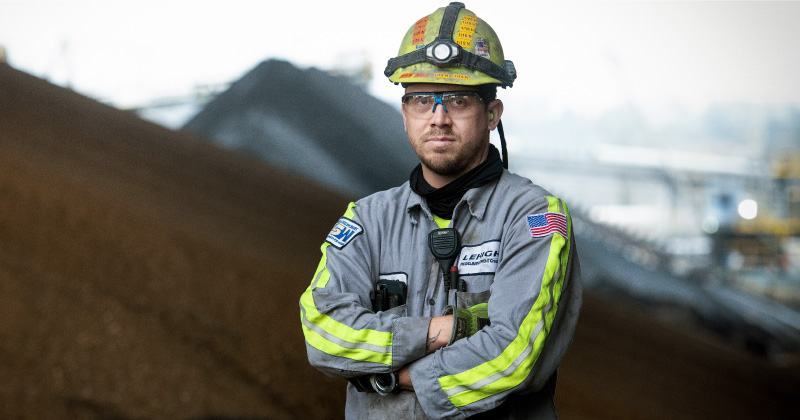
“The union and the company did a great job working together,” said electrician Marty Hildebrand.
Local 8-00031 leaders also work closely with other union members in the industry, negotiating their collective bargaining agreements jointly with workers at two other Lehigh facilities.
That collaboration, both with management and within the union, has helped to deliver the good wages, strong benefits and a secure retirement that keep USW members on the job for the long haul. It has also helped the company become a leader in an industry that is positioning itself for a solid future.
“This is a place where you can grow and raise a family,” Eyler said.
The USW is committed to making sure that remains true for decades to come, said District 11 Director Emil Ramirez, who serves as chair of the USW cement council.
“The USW is proud of the relationship we have built with Lehigh and our other partners in the cement industry,” Ramirez said. “Our union’s push for long-term sustained investments in our national infrastructure will ensure that future generations of USW members continue to produce quality products while enjoying the security and benefits that the workers at Lehigh have earned.”
Making sure the future is secure for upcoming generations is something that is important to both management and USW members in Union Bridge. Mullican’s son recently started a USW-represented job at the plant, making his one of many multi-generational families working there.
“The sky’s the limit here,” said Eyler, who has lived in the area since he was 8 years old and is now a father himself. “We are providing a better life not just for ourselves and our families, but for generations of families. The future is bright.”

